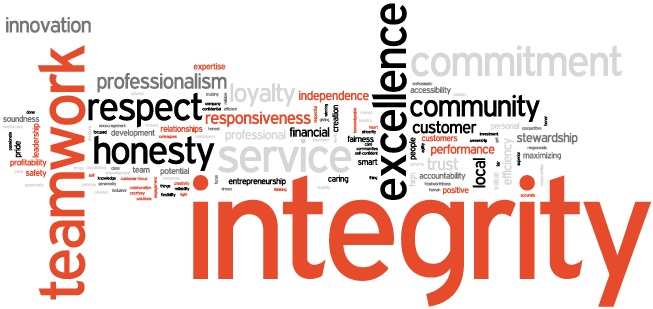Values
I am going through an interesting exercise at present; articulating my organisational values. Articulating values is so critical and yet so many organisations get it wrong.

Thanks to thefinacialbrand.com for the image
Why have organisational values?
I can’t tell you how many times I have been sitting in a corporate office with a glossy poster espousing the values, and then have a conversation with an employee who either can’t articulate the values or worse, says that the values are not consistent with real life “around here”.
And sometimes they are just the same values as everyone else (think about the number of times that integrity, respect, teamwork come up as values).
So, why have values? To my way of thinking, their key value is that it can be such a powerful filter for individuals within organisations. Values can truly sum up the way that an organization acts, the decisions it makes and the sorts of people that it wants working for it.
What are values?
Peter Hyde provides a great definition of personal values: “..Underlying and relatively stable dispositions which people use to guide their actions and decisions and to help them make judgments about what is right and wrong..
Peter goes onto say:
“..We believe that the core values of your organisation exist whether or not you or your predecessors have made them explicit. They are bound into the fabric of your organisation. They probably bear the hallmarks of the founder of your organisation. They will have shaped and have been shaped by, the organisational processes; procedures and practices that are now part and parcel of your organisational life. And they will be revealed and reinforced by behaviours; traditions; rituals; and myth telling which have come to define ‘the way we do things around here’.
…
Finally, the determining factor in whether or not you can become a ‘values-driven’ business is how successful you are in translating you core values – and those your workforce might not see as core but are nevertheless important to you – into behavioural patterns that begin to transform performance…”
Organisational life these days often requires quick decisions; and sometimes those decisions are made in the absence of all the required data, or without a completely robust decision making process. Organisational values that are authentic to the organisation can provide a quick frame of reference; provide another lens to test the validity of the decision for the organisation.
As an example, one of Enron’s values was “integrity”. A truly socialized value of integrity – might (!!) have provided the lens through which Enron decisions might have been seen for what they were (lacking in integrity!).
The flip side to the Enron example is how organisational values can become a mockery, and how sometimes, an organisation is better off not having the glossy poster sitting on the wall, rather than have the poster that is so inconsistent with reality.
So, tell me your experience.. Where have you seen organisational values truly lived and breathed? And is the glossy poster that is not lived and breathed better than nothing? Or are there times were nothing is better than something that is wrong?

